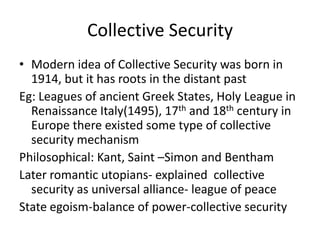
Modern Idea of Collective Security
- 1. Collective Security • Modern idea of Collective Security was born in 1914, but it has roots in the distant past Eg: Leagues of ancient Greek States, Holy League in Renaissance Italy(1495), 17th and 18th century in Europe there existed some type of collective security mechanism Philosophical: Kant, Saint –Simon and Bentham Later romantic utopians- explained collective security as universal alliance- league of peace State egoism-balance of power-collective security
- 2. Development of collective security • The Woodrow Wilson regarded as the enunciator of concept in modern time • The shock of first world war forced total reconsideration of the old ways of diplomacy, rival alliances and balances of power • James Bryce proposed the League shall under take to defend any one of its members who may be attacked by any other State who has refused to accept arbitration or conciliation • Under League of nation: Articles 10-16 • UN Charter Chapter VII- Article 39-51
- 3. Collective Security • Collective security is regarded as most effective device of maintaining peace and deterring aggression. • It is a device by which the security of all nations is assured • It provides assurance that any attempt to use force in international relations will be frustrated. • Under this system of collective security, aggression or war would no longer be the concern of any individual nation, but would be the concern of all nations
- 4. Meaning • Aggression is a crime against humanity • Security represents the goal and the word collective indicates the nature of the means employed. • The basic principle is that an attack on one nations will be regarded as an attack on all states( one for all, all for one) • It is the machinery for joint action in order to prevent or counter any attack against the establishment of international order • The security becomes the concern of all nations and they take care collectively • It is a mutual insurance plan. The collective action will be sufficient to deter the potential aggressor
- 5. Nature of Collective Security • Collective security recognizes the relevance of power in international politics. It accepts the fact of war as a reality. • Collective security is a device of a management of power, not that of the elimination of power. • Collective security is something less than world government and more than balance of power or it can be considered to be an alternative of the world government, because latter is not feasible • A proper functioning of collective security system possible only through international organisation • It is different from balance of power and collective defense
- 6. Basic Assumptions The system of collective security can only operate if the following assumptions are realised • Able to muster at all times or adequate to meet any situation • The universal agreement of nations • Peace should be given priority and must be willing to subordinate political difference • The combined strength to meet the threat of aggression • All nations should be equally interested in stopping aggression and protecting the interest of affected nations • It is not directed against any particular state but against aggression in general • A basic condition for the success of collective security system is procedure for peaceful change and widest acceptance of the pacific means of settlement of international dispute
- 7. Evaluation/Criticism • The theoratical aspect of collective security system appears to be logical and flawless, but in its actual operation it reveals number of short comings and drawbacks(unrealistic and unworkable) • The machinery of collective security system has never been satisfactory developed under League of Nations or United Nations • Most of the assumptions are hypothetical • It is an ideal assumption- not work in the contemporary world • In the age of nuclear age it became more irrelevant
- 8. Collective Security- Overview • Japanese extension of military control over Manchuria in 1931, followed by Italian campaign in Ethiopia in 1935. • In 1933 Japan received a verbal rebuke from the league for its behaviour, they simply resigned from the league. Britiin tried organise economic sanctions against Italy, but that led to the closer association of Mussolini and Hitler • The compromise pattern for collective security adopted by the European nations did much to diminish the enthusiasm • The numerous direct negations between the major European powers during the tense crises of 1930;s and 40’s bypassed the machinery of the league • Selfish interest of nations • The league had no military power of its own
- 9. United Nation’s regime and collective security • Power struggle between two blocks ensured the failure of collective security and rendered united nations increasingly irrelevant • The failure of Congo Mission 1961 • The Collective Security mechanism developed by power blocks or regional arrangements affected Eg: NATO, Central Treaty Organisation(CENTO) and Southeast Asia Treaty Organisation etc.. • 1960’s Vietnam War
- 10. Topics to be discussed • Difference between peace keeping and collective security • Collective security and new form of interventionalism- Kosovo in Serbia and Sierra Leone, Rwanda • American Intervention and collective security